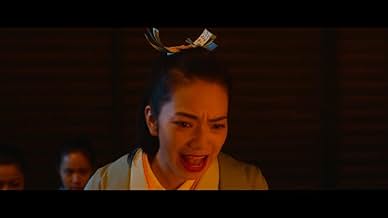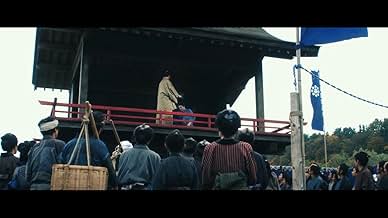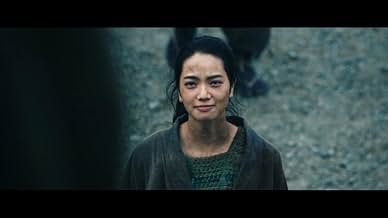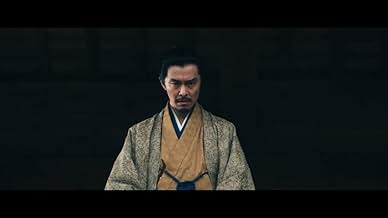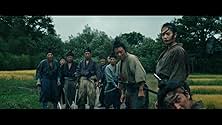IMDb RATING
6.2/10
1.3K
YOUR RATING
In 1855, a daimyo sends his men on a grueling marathon to discover if they're tough enough to face the newly arrived Americans. Misunderstanding his intent, the Shogun dispatches assassins.In 1855, a daimyo sends his men on a grueling marathon to discover if they're tough enough to face the newly arrived Americans. Misunderstanding his intent, the Shogun dispatches assassins.In 1855, a daimyo sends his men on a grueling marathon to discover if they're tough enough to face the newly arrived Americans. Misunderstanding his intent, the Shogun dispatches assassins.
- Awards
- 2 nominations total
Featured reviews
This historical Japanese action/drama is a good story and reasonably well acted. However, the one issue that I believe lets it down is the translation. It always appears ,based on actors replies to other comments, that more has been said, or explained. Thus pertinent information is missing. These omissions probably would have given greater depth to the movie and may have enjoyed it more.
C'mon man. I give it a solid 8. The Japanese film makers are really just masters at story telling. This is a great story with numerous side-stories of a remote Japanese regional "Lord" ordering a Marathon to his retainers, as he is supicious of the newly arrived Americans and wants to see if his retainers are in shape. There has been peace in Japan at this point well over 200 years. The Big Shogun gets a mistake message sent to him by one of his spies that the guy is preparing to war with Shogun, so Shogun sends out some assassins with American-gifted pistols...it is impeccably acted and photographed, a nuanced story that is historic, amusing and just hints at tragedy in a very clever way. Not everything has to be special effects and blazing action. A good story is the root and DNA of film, more thn anything else.
Partially based upon historical events, Bernard Rose's Samurai Marathon portrays how a Japanese lord sends his men on an exhausting run to get them prepared for a potential attack by Western forces after centuries of isolation. The movie follows different characters involved in the marathon such as a boy attempting to honour his father, a conflicted spy whose loyalty gets tested and a rebellious princess longing for freedom. The main plot revolves around a misunderstanding as the military dictator misunderstands the marathon as a rebellion and sends his assassins to murder the feudal lord.
The movie convinces on quite a few levels. The settings are chosen with care and bring feudal Japan to life in an authentic way that will please historians despite a few minor inaccuracies. The different characters have depth and make the story diversified. The plot includes a few interesting twists and turns. The final thirty minutes are intense and feature some realistic fighting scenes. The vibrant score is epic and enhances the movie's menacing atmosphere.
However, the film isn't without its flaws. The introduction to the different characters and settings takes half an hour which makes for a somewhat plodding start. There are no noteworthy action scenes until the sixty-sixth minute. Those who are expecting a gripping sword fighting movie might be disappointed. This movie is a surprisingly slow paced drama with some action elements in the final third. Especially the ending should have been more intense as the film rather fades out than ends with a bang.
In the end, Samurai Marathon is recommended to those interested in Japanese culture, history and traditions. The diversified characters and dynamic story make for a convincing drama. The movie however also has its lengths and fails to leave a deeper impression. It certainly disappoints if you have been expecting an action film from the misleading trailers. The movie recalls samurai movies from the fifties and sixties by Kurosawa Akira, Misumi Kenji and Uchida Tomu.
The movie convinces on quite a few levels. The settings are chosen with care and bring feudal Japan to life in an authentic way that will please historians despite a few minor inaccuracies. The different characters have depth and make the story diversified. The plot includes a few interesting twists and turns. The final thirty minutes are intense and feature some realistic fighting scenes. The vibrant score is epic and enhances the movie's menacing atmosphere.
However, the film isn't without its flaws. The introduction to the different characters and settings takes half an hour which makes for a somewhat plodding start. There are no noteworthy action scenes until the sixty-sixth minute. Those who are expecting a gripping sword fighting movie might be disappointed. This movie is a surprisingly slow paced drama with some action elements in the final third. Especially the ending should have been more intense as the film rather fades out than ends with a bang.
In the end, Samurai Marathon is recommended to those interested in Japanese culture, history and traditions. The diversified characters and dynamic story make for a convincing drama. The movie however also has its lengths and fails to leave a deeper impression. It certainly disappoints if you have been expecting an action film from the misleading trailers. The movie recalls samurai movies from the fifties and sixties by Kurosawa Akira, Misumi Kenji and Uchida Tomu.
I don't know what's more surprising: that this should be a co-production between Japan and the United Kingdom, or that it's co-written and directed by the same man who gave us the modern horror classic 'Candyman.' For good measure, add in recognizable American actor Danny Huston, and American composer Philip Glass. More concerning is how terribly heavy-handed the picture is from the outset, making a poor first impression, and the character writing, scene writing, and direction that - somewhat being both blunt and cheekily playful, and amplified or embellished for dramatic effect - readily intone modern U. S. or British cinema more than the sensibilities of modern Japanese period pieces, let alone classic jidaigeki that count among some of the very best films ever made. Furthermore, I can't help but wonder if the production values of 'Samurai marathon' aren't too pristine and flawless for its own good, as there can be a very thin line between perfection on the one hand, and sterility and contrivance on the other, especially where modern cinema is concerned. The very first instance of violence that we see rather accentuates all these points.
Now, maybe given Rose's career in the American and British film industries, there was never any chance that he could have echoed the supremacy of Kurosawa Akira, Kobayashi Masaki, Inagaki Hiroshi, or for a more recent example, Yamada Yoji. Maybe it should be fully acceptable that Rose brings modern western sensibilities of movies to this co-production. Maybe I lean too hard on my past experiences with movies of all stripes; maybe I'm nitpicking, and being too harsh. After all, even as these issues are foremost for me in the viewing experience, I do not doubt the earnestness of anyone's intent, it's certainly not as if the feature is poorly made, and none of these matters are so severe as to completely dampen the overall quality. So what if there are clashes to some degree between the period setting, the modern sensibilities, and the styles of East and West? Glass is a reliably great composer and his score here is lovely, scrutinize as we may how it fits in; just as one way or another the production values at large meet the highest standards of the twenty-first century, Ishizaka Takuro's cinematography is faithfully crisp, vivid, and smart. Imperfect and sometimes even gawky as the screenplay may be as Rose co-writes with Saito Hiroshi and Yamagishi Kikumi - adapting Dobashi Akihiro's novel - the story is compelling and absorbing, with many moving parts at a major turning point in Japan's history. I've no doubt that the prose is more rich, expansive, and fully fleshed out, as is routinely the case when such works are adapted to the screen, but in and of itself 'Samurai marathon' is engaging, enjoyable, and keeps us watching.
There are airs of drama and adventure (and light touches of humor) that are not sullied by any amount of hard-nosed assessment, and as the course of events progress with all these characters we're firmly invested to see just where it's all going to end up. There is a world of potential in the saga of a daimyo concerned by the arrival of Commodore Perry; an overzealous spy who misunderstands the daimyo's intentions as he tests the prowess of the samurai in his domain with a marathon; and the competing interests, motivations, and personalities of all figures herein. Him and haw as one may, that potential is met much more than it is not. There is much to admire in these hundred-odd minutes, and the feature really is well made. The filming locations are gorgeous, and so to is the production design and art direction; like care was poured into even the costume design, hair, and makeup. Just as some moments in the writing or direction are more questionable, some are kind of altogether brilliant, and Glass' music can also claim some shrewd finesse (even as another particular, repeated piece of music is downright ill-advised). While the first example is an unfortunate counterpoint, the stunts, choreography, and action sequences are broadly fantastic as the peril to all involved grows alongside the drama. The cast give strong, commendable performances, with no one necessarily standing out above the others save for the prominence of their roles. Even the editing and sound design are pretty sharp.
In fact, all told, I quite believe 'Samurai marathon' is excellent. It's just regrettable that some key choices pointedly diminish that excellence, representing a different variety of cinema that is at odds with too much else about the title. Such issues persist all the through to the end as the last ten to twenty minutes are plagued with curious tonal peculiarities amidst outright sloppy resolution, as if Rose didn't entirely know how it all should end. I don't specifically blame Rose, nor Glass, nor co-producer Jeremy Thomas, nor anyone else, but I do wonder if it's not the case that this Japanese story would have been better off left in the hands of a purely Japanese production to tell it. Where the sum total succeeds, it is inarguably superb; where it missteps, I feel outright dismayed at how wrong it went. I really do like the picture when all is said and done, and I'm pleased to give it my recommendation - and so long as one is aware that it's a recommendation paired with an asterisk and considerable caveats, then it's well worth checking out if one has the opportunity.
Now, maybe given Rose's career in the American and British film industries, there was never any chance that he could have echoed the supremacy of Kurosawa Akira, Kobayashi Masaki, Inagaki Hiroshi, or for a more recent example, Yamada Yoji. Maybe it should be fully acceptable that Rose brings modern western sensibilities of movies to this co-production. Maybe I lean too hard on my past experiences with movies of all stripes; maybe I'm nitpicking, and being too harsh. After all, even as these issues are foremost for me in the viewing experience, I do not doubt the earnestness of anyone's intent, it's certainly not as if the feature is poorly made, and none of these matters are so severe as to completely dampen the overall quality. So what if there are clashes to some degree between the period setting, the modern sensibilities, and the styles of East and West? Glass is a reliably great composer and his score here is lovely, scrutinize as we may how it fits in; just as one way or another the production values at large meet the highest standards of the twenty-first century, Ishizaka Takuro's cinematography is faithfully crisp, vivid, and smart. Imperfect and sometimes even gawky as the screenplay may be as Rose co-writes with Saito Hiroshi and Yamagishi Kikumi - adapting Dobashi Akihiro's novel - the story is compelling and absorbing, with many moving parts at a major turning point in Japan's history. I've no doubt that the prose is more rich, expansive, and fully fleshed out, as is routinely the case when such works are adapted to the screen, but in and of itself 'Samurai marathon' is engaging, enjoyable, and keeps us watching.
There are airs of drama and adventure (and light touches of humor) that are not sullied by any amount of hard-nosed assessment, and as the course of events progress with all these characters we're firmly invested to see just where it's all going to end up. There is a world of potential in the saga of a daimyo concerned by the arrival of Commodore Perry; an overzealous spy who misunderstands the daimyo's intentions as he tests the prowess of the samurai in his domain with a marathon; and the competing interests, motivations, and personalities of all figures herein. Him and haw as one may, that potential is met much more than it is not. There is much to admire in these hundred-odd minutes, and the feature really is well made. The filming locations are gorgeous, and so to is the production design and art direction; like care was poured into even the costume design, hair, and makeup. Just as some moments in the writing or direction are more questionable, some are kind of altogether brilliant, and Glass' music can also claim some shrewd finesse (even as another particular, repeated piece of music is downright ill-advised). While the first example is an unfortunate counterpoint, the stunts, choreography, and action sequences are broadly fantastic as the peril to all involved grows alongside the drama. The cast give strong, commendable performances, with no one necessarily standing out above the others save for the prominence of their roles. Even the editing and sound design are pretty sharp.
In fact, all told, I quite believe 'Samurai marathon' is excellent. It's just regrettable that some key choices pointedly diminish that excellence, representing a different variety of cinema that is at odds with too much else about the title. Such issues persist all the through to the end as the last ten to twenty minutes are plagued with curious tonal peculiarities amidst outright sloppy resolution, as if Rose didn't entirely know how it all should end. I don't specifically blame Rose, nor Glass, nor co-producer Jeremy Thomas, nor anyone else, but I do wonder if it's not the case that this Japanese story would have been better off left in the hands of a purely Japanese production to tell it. Where the sum total succeeds, it is inarguably superb; where it missteps, I feel outright dismayed at how wrong it went. I really do like the picture when all is said and done, and I'm pleased to give it my recommendation - and so long as one is aware that it's a recommendation paired with an asterisk and considerable caveats, then it's well worth checking out if one has the opportunity.
Samurai Marathon is apparently based on a true story, or, at least, on true events. That is why the movie was just a bit ... I wouldn't say boring but it lacked intensity. Usually, with samurai movies you expect action scenes that can take your breath away, wonderful speeches about greatness and deep emotions. Here, you get nice characters, but a flat story.
The action scenes were okay, but just a bit boring. The characters, moreover, were interesting, but they were too many to follow and that's why the movie couldn't handle them and they ended up falling through the cracks and disappearing.
The performances, as expected, were brilliant. The movie was packed with Japan's big names (I mean Sato Takeru was one of the leads and that is enough reason to watch this one).
So, overall, six out of ten.
The action scenes were okay, but just a bit boring. The characters, moreover, were interesting, but they were too many to follow and that's why the movie couldn't handle them and they ended up falling through the cracks and disappearing.
The performances, as expected, were brilliant. The movie was packed with Japan's big names (I mean Sato Takeru was one of the leads and that is enough reason to watch this one).
So, overall, six out of ten.
Did you know
- TriviaCommodore Perry introduces the Colt Peacemaker as a 'single action revolver'. Being that it's 1855 and double action revolvers wouldn't be invented until 1889 there wouldn't be mention of single vs' double action yet.
- GoofsThe opening scene has Commodore Perry present the Shogun's chief minister with a brace of Colt Model P (popularly called the Peacemaker) revolvers. The Model P and its accompanying .45 Colt cartridge weren't introduced until 1873, 18 years after the events depicted in the film.
- How long is Samurai Marathon?Powered by Alexa
Details
- Release date
- Countries of origin
- Official sites
- Language
- Also known as
- Samurai Marathon 1855
- Filming locations
- Production companies
- See more company credits at IMDbPro
- Runtime
- 1h 43m(103 min)
- Color
- Sound mix
- Aspect ratio
- 2.39:1
Contribute to this page
Suggest an edit or add missing content

